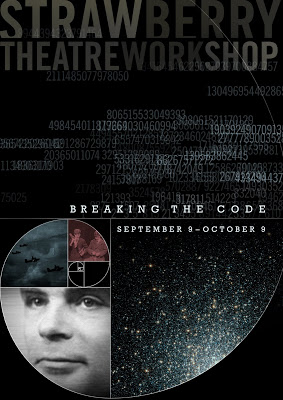Review: Breaking the Code by Hugh Whitemore. Produced by Strawberry Theatre Workshop. Directed by Sheila Daniels. With Bradford Farwell, Charles R. Leggett, Galen Joseph Osier, Amy Fleetwood, Alycia Delmore. Now through October 9 at the Erickson Theatre Off Broadway.
The 1990’s were a boom time for local theater in Seattle as local companies grew and prospered and donated to the arts and the Boomers and Gen Xers with good jobs supported and attended the theater. But, the DotCom bust at the turn of the millennium and the subsequent real estate boom and escalation in rents led to the death of many mid-size theater groups in Seattle; the big guys like Intiman and the Rep are still around and so are dozens of small fringe groups but the midsized theaters were largely squeezed out of existence. Happily, there has been a slight rebound in the last few years with the emergence of Washington Ensemble Theatre, New Century Theatre and one of the best and brightest newer companies in town, Strawberry Theatre Workshop, or, Strawshop for short. Since their debut in 2004, the Strawshop has consistently produced ensemble driven theatre pieces of the highest calibre, winning awards and the adulation of Seattle’s serious theatergoers. Their beautifully moving and textured production of “The Laramie Project” this summer won rave reviews and a just announced Gregory Award nomination for Best Production of the 2009/2010 season. If the nominating committee has a long enough memory to not forget, (this is the start of the new theater season), the Strawshop’s current production of Hugh Whitemore’s drama, “Breaking the Code” is likely to be on that list NEXT September when the 2010/2011 nominations are announced. “Breaking the Code” is another in a long line of impeccably directed, meticulously designed and powerfully acted theater productions from the Strawshop. They are turning out to be like the smart kid in your class…the one who NEVER gets anything less than a B+. However, unlike the obnoxious overachiever in American Lit class, we look FORWARD to what the Strawshop has to say…they never rest on their multitude of laurels.
Breaking the Code is the true story of Alan Turing, the brilliant British mathematician who was instrumental in breaking the Nazi’s Enigma Code during World War II and in effect, helped win the war for the Allies. Turing’s work after the war concentrated on the infant science of computers and he is largely considered to be one of the parents of the modern computer. (Fun Fact: Turing’s work was vast and varied but one aspect of his work you are well aware of: the CAPTCHA test used to verify that a human is entering information into a webform and not a computer program, is based on his research!) Today, the Turing Prize is the highest honor in Computer Science, the equivalent of the Nobel Prize. His war work was classified Top Secret for many years, but eventually was revealed and Turing was praised as a hero and voted one of the most important Britons of the 20th century. Alan Turing was also a gay man who chose to live a relatively open life in a time and a country that still prosecuted “gross acts of indecency”. Turing was convicted of those “acts”, (the same laws that were used to prosecute Oscar Wilde 60 years previously) in 1952 and was allowed to choose probation over imprisonment. But, the probation came at a cost; Turing was ordered to undergo chemical castration (the ingestion of female hormones which caused him to develop breasts, among other side effects) and in 1954, despondent over his life, he committed suicide. He was only 41 years old.
The bluntness of the bio would lead to assumptions that the play is depressing, but Hugh Whitemore’s script deftly weaves humor, warmth and wistful charm into the story. Spanning several decades of Turing’s life, the play shifts in time and back again, with an overall arc of a police detective questioning Turing and eventually charging him with those “gross acts” and Turing’s life after his conviction, his treatment and his ultimate fate, which is tenderly handled and not a weepy, saccharine downer. His life was a good one; important things were accomplished and relationships were cherished and while his outcome is bitter, especially to queer audiences, the life is still one to celebrate and revere. There is, not surprisingly, a lot of math in the play, but it is presented naturally and consisely and never pedantically. Mr Whitmore’s gift for language makes it seem very relatable to the audience and prevents the “math zone out” for those so not inclined…
Director Sheila Daniels, one of the most artistically important and gifted directors in the city, very assuredly moves the actors through the shifts in time and place with simple, deft and crisply defined staging and choreography. Each vignette and tableau is very carefully composed but not static and never rigid; the directing is invisible, the execution is fluid and natural and organic. Ms Daniels meticulousness even extends to the movements and actions of the actors that move the props and furniture and set pieces during the precisely timed set changes; I have visions of the director using a metronome to time those changes and count off the necessary beats to keep the action moving. It’s balletic in execution and never comes off as false or forced. It is intuitive, but carefully thought out stage direction and Ms Daniels is proof that the artistry of a director is a key point to the success of a theatrical production.
You can always expect a well-designed show from Strawshop, and “Breaking the Code” is no exception. Keeping to neutral tones with sets and costumes with only the use of a very vivid red as an accent in one very important prop, used as a motif in the play, and in some of the wiring spilling out of an old computer used as set dressing, the focus of the play remains firmly on the text and the performances. My reviews tend to be (too) long but I have the space and the very powerful need to credit good work and designers are frequently ignored in reviews, so I think it’s important to mention that Ron Erickson is responsible for the impeccably designed and historically accurate costumes that range from the 1920’s to 1952 that manage to be faithful to the muted tones of the overall production design yet remain interesting and vibrant to the eye; and that LB Morris is one of the strongest and most artistically interesting lighting designers in town and cinematically frames the characters and moments in light that is both natural AND theatrical; and that Greg Carter was responsible for the simple but complex set that very adequately conveyed a number of different settings and moments in place, time and memory; and that Robertson Witmer’s music was simple, never intrusive and always managed to convey the necessary moods and nuances necessary to the play’s themes. They are all part of Strawshop’s ideal of the ensemble…to be a good member of the neighborhood; to contribute SOMETHING important.
I’ve saved the actors for last. The supporting cast is exceptionally good with the usual strong performances from Amy Fleetwood as Turing’s veddy, veddy British mother (who, with little change in make-up/hair manages to convincingly age 30 years in the play); Charles R. Leggett as Turing’s boss on the Enigma project, who cautioned Turing to be more circumspect with his homosexuality; Tim Gouran as the working class lover who was also charged with “gross indecency”; Alycia Delmore as the colleague who loved Turing and was willing to marry him, despite his homosexuality; and in small roles, John Ulman as a government agent and Alex Garnett in dual roles as Turing’s boyhood love and a Greek lover he takes while on holiday. All of them do strong work in this production. And, I have to single out the excellent performance of Galen Joseph Osier as the Scottish police detective who discovers the truth about Turing and eventually arrests him. In lesser hands, the role could come off as villainous and vile, but Mr Osier’s performance underlines the strength and personal integrity of Detective Mick Ross; he might not really care what people do in the privacy of their own home, but he has forsworn to uphold the law. It is a laser sharp performance of very powerful intensity and a credit to Mr Osier. (And, according to my theater date who grew up in Scotland, he uses an impeccable and accurate Scottish accent!)
All these actors do fine work and all deserve praise but they do all pale in comparison with the lead character. “Breaking the Code” is about one man, Alan Turning, and while the other characters interact with him, he is always the center of attention and is only offstage for a few moments during the play. It’s a one man show with eight actors in it and it takes a talented and strong artist to successfully pull off this role. Bradford Farwell is just that artist. It is a strong and riveting and emotionally powerful performance that should justly be shortlisted for a Gregory next year. The great British actor, Sir Derek Jacobi, (best known to Americans as Claudius in “I, Claudius”) originated this role nearly 25 years ago and Mr Farwell’s acting is as assured and natural and compelling as Sir Derek’s…I closed my eyes a couple of times during “Breaking the Code” and just listened to Mr Farwell performing and it was still revelatory and enthralling and very compelling. He is never mawkish, or sentimental, or feels the need to make Turing a victim, or object of pity. He just makes him real and vibrant and very, very human. I am very happy to have been introduced to the talents of Mr Bradford Farwell. (He also got an A for his accent from my UK residing “date”)
And, another “A” for the Strawshop as well…hopefully, some of the “slower” theaters in town won’t beat it up after class gets out. I encourage the rest of you to not be dummies either, and go see this play…
-Michael Strangeways















